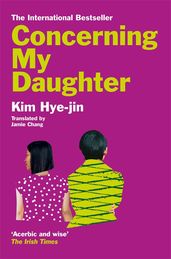Synopsis
The Prize-Winning International Bestseller
'I can't help but be moved by a story about women meeting, fighting, helping each other, looking after one another, and raising their voices against the prejudice and criticism they are subject to.'
Cho Nam-joo, author of Kim Jiyoung, Born 1982
When a mother allows her thirty-something daughter to move into her apartment, she wants for her what many mothers might say they want for their child: a steady income, and, even better, a good husband with a good job with whom to start a family.
But when Green turns up with her girlfriend, Lane, in tow, her mother is unprepared and unwilling to welcome Lane into her home. In fact, she can barely bring herself to be civil. Having centred her life on her husband and child, her daughter’s definition of family is not one she can accept. Her daughter’s involvement in a case of unfair dismissal involving gay colleagues from the university where she works is similarly strange to her.
And yet when the care home where she works insists that she lower her standard of care for an elderly dementia patient who has no family, who travelled the world as a successful diplomat, who chose not to have children, Green’s mother cannot accept it. Why should not having chosen a traditional life mean that your life is worth nothing at all?
In Concerning My Daughter, translated from Korean by Jamie Chang, Kim Hye-jin lays bare our most universal fears on ageing, death, and isolation, to offer finally a paean to love in all its forms.
Details
Reviews
An admirably nuanced portrait of prejudice . . . one that boldly takes on the daunting task of humanizing someone whose prejudice has made her cruel.
An acerbic and wise book.
I can't help but be moved by a story about women meeting, fighting, helping each other, looking after one another, and raising their voices against the prejudice and criticism they are subject to.
The self-questioning nature of Hye-jin’s narrator allows her to explore the tensions between mother and daughter with great deftness. The mother’s socially conservative values clash against her unwavering love for her daughter: how best to protect Green in a dangerous, changing world?
